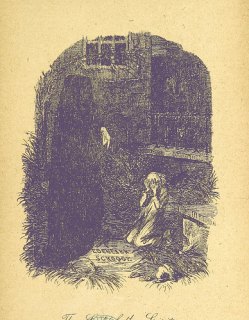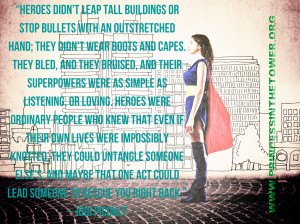If you’re just not feeling the joys of the festive season it can make it even more difficult to partake, especially as it often flares chronic pain, or exhaust already slender energy levels. It’s hard to feel excited when the weight of chronic illness sits heavy on every act, taking such immense preparation and recovery, when everything hurts, and when you know that how ever much you do partake, it will mean more pain.
Winter too is often the toughest time of year for so many who live with painful chronic conditions. Other challenges from depression to fatigue to nausea to inability to think or converse as freely as you’d like — through brain fog, high pain, medication or a fusion of them all — also makes being a part of celebrations complex. Yet we do still long to connect with loved-ones, especially if so often isolated because of chronic illness and pain.
Before you mutter “Bah, humbug!” or let these all too real, and excruciating challenges turn you into Ebenezer Scrooge himself this Christmas, this post offers you ways to cope with calm equipoise, with increased pain too, as well as tips for coping with the disbelief or “advice” from loved-ones, and there’s not an unidentified relative, mince pie or piece of mistletoe in sight.
“The cold within him froze his old features, nipped his pointed nose, made his eyes red, his thin lips blue, and spoke out shrewdly in his grating voice…” ~ Charles Dickens’ 1843 novella, A Christmas Carol

Though Scrooge’s tale of redemption was by the three Ghosts of Christmas (Ghost of Christmas Past, Ghost of Christmas Present, and Ghost of Christmas Yet to Come), here’s three ways to:
-
Deal with difficult emotions
-
Cope with the reactions of others
-
Distract yourself from pain if flared-up
-
Lessen pain naturally
“Bah, humbug!”
“Christmas isn’t any different than any other day for someone who is chronically ill. You still feel lousy. It is harder if the family is putting pressure on that person to be jovial or is in denial about the person’s illness.
“It is helpful if the ill person can let family members know that Christmas doesn’t cure the illness and that he or she is not a Scrooge for not feeling well,” says Dorothy Cantor, Psy.D., former APA president.
“Try to articulate what you need from those around you — because they may not know how to help you — and ask for their understanding if you decline to engage in an activity. If you are already experiencing stress in other areas of your life, you may be especially vulnerable to increased anxiety during the holidays. Sometimes self-care is the best thing you can do. All of us need some time to recharge our batteries — by slowing down you will actually have more energy.”
3 Ghosts of Emotional Coping Tools
Dealing with the many losses and limits that come with chronic pain and illness is often inevitably far harder at this time of year, more so when so many who we love and long to be with are celebrating but us, in pain, and bed, unable to join them or express our love for them.
“This is a particularly hard time of year for me because it brings into focus just how limited my life has become. Every year, I have to accept anew my inability to travel or even attend holiday parties that are nearby,” says Toni Bernhard, chronic illness patient, psychology professor, and author of a series of highly recommended books on living well and coping with chronic illness.
1. Be Kind to Yourself & Have Self-Compassion
Although everyone can benefit from treating themselves, and others, with compassion, when pain is relentless, and chronic illness too, it’s essential. Yet, much like even the healthiest people, we can talk to ourselves harshly. Sometimes it stems from frustration or from annoyance at ourselves for overdoing things, and not listening to our body.
Other times the reason we are so hard on ourselves stems from guilt — at not being able to be ourselves, keep our once-reliable word, and commitments, or help others at this and every other time of year; be the useful, kind person we are, or rather express as we once could before the pain — and the shame that so many of us may feel at ‘never getting better’, no matter how hard we try or how irrational that may seem.
Just as every emotion can be magnified at this time of year, so too can these feelings of guilt and shame. We may know on an intellectual level that we are not to blame, that we should feel no shame nor blame but despite the difficulties inherent in such complex circumstances as these, we are still so often unkind to ourselves. Compassion, especially self-compassion is a powerful antidote to these natural but unwarranted feelings.
“Self-compassion means looking at yourself with kindness, with a conscious awareness of your sufferings. It is choosing, in any particular situation, and over and over again whether you’ll treat yourself well, or beat yourself up, whether you’ll deny yourself, or treat yourself lovingly,” said Daphne Rose Kingma in her book, ‘Loving Yourself’.
“Ultimately, self-compassion is a series of choices, a moment by moment conscious turning away from that which will harm your spirit toward that which will nourish and sustain you.” When the world’s celebrating, and you in pain and bed, remember to be kind to yourself, to talk to yourself kindly too because, “every time you judge yourself, you hurt yourself,” as Brazilian lyricist and novelist, Paulo Coelho once said.
“Self-kindness means that we stop the constant self-judgement, and disparaging internal commentary that most of us have com to see as normal,” says pioneer in compassion research, and author of Self-Compassion: The Proven Power of Being Kind to Yourself, Kristin Neff, who says that being mindful can help you be self-compassionate.
“When our troubled, painful experiences are framed by the recognition that countless others have undergone similar hardships, the blow is softened.” Shift from a place of mentally scolding yourself to one of treating yourself kindness with compassion—especially at this time of year.
2. Respond to Skilfully to Difficult Feelings
Although mindfulness does have beneficial effects on the pain, it’s especially healing — and more so if finding this time of year difficult — as it helps you cope with difficult emotions that so often come with a life lived in pain, such as heartache, frustration, anger, and sadness.
This is important as while the pain may be ever-present, it helps ease the additional pain of reacting to the suffering, and thereby increasing it. “Mindfulness skills are indispensable when I get caught in the net of too much ruminating about the past or when I can’t stop fretting and worrying about the future,” says Toni Bernhard.
“When I become aware that I’m doing this, I stop, take a few conscious in- and out-breaths, and pay attention to the what’s going on right now at my five sense doors. Even if the experience of the moment is not a pleasant one, at least I’m present for it, and that feels better than being lost in stories about the past and the future that serve only to increase my mental stress.” Obviously we’re human, and have wobbles, and of course it’s natural to be sad when you’re missing out on so much, and in such uninterrupted pain.
Mindfulness allows you to step back and observe while being present. Sometimes all we can do is escape it, the moment, the pain, and distraction the only means but other times mindfulness is a healing and supportive way to manage a difficult life, while also having positive benefits for your brain. With practice, you may be better able to live beside your pain. It also helps many feel more relaxed, and less tension means you’ll be in a little less pain.
3. Allow Yourself to Feel How You Feel [It’ll Save a Spoon]
“When you are less than jolly during the merriest time of year, it can lead to feelings of guilt and further perpetuate depression. I often feel like my unhappiness, if not well-hidden, is going to ruin everyone else’s time,” says chronic pain patient and advocate, Tracy Rydzy.
“I liken it to being in a dark cave where I can see the twinkling of Christmas lights at the end of the proverbial tunnel, but I can’t seem to walk toward it. It feels like the closer we get to the holidays, the further into the hole I go. I don’t force myself to be happy, yet sometimes, without trying, I am able to smile and enjoy myself.”
Allow yourself to feel what you feel. Sometimes expectations create further internal tension with the need to be a certain way intensify feelings that you’re not. “If you are not happy and merry, it’s okay. People are not as happy as they seem during the holidays, you are not alone. Try not to let being down get you down. The pressure to be happy only leads to more unhappiness, so let it go. You are human and no one expects you to be jolly all the time, after all, you are not Santa Claus,” says Tracy Rydzy.
You may also like to try these tools from ACT Psychology, or these CBT techniques.
3 Ghosts of Escape & Distraction [After Overdoing it]
Sometimes you know you’ll exceed your own pacing limitations, and this time of year it’s a near certainty. Although these ways to cope, and calm pain are useful no matter the season, they become invaluable when pain is fervent but you’re expected to somehow keep going.
1. Take ‘Comedy’ Pacing Breaks

Taking frequent breaks is crucial if you want to lessen the consequences of exceeding pacing limitations or doing far more than usual. Fusing this with a little comedy, and you have something that rests your body, calming your nervous system, while delivering pain-easing and joy-inducing benefits.
Even in the most difficult of times, finding humour is one of the most effective ways to reduce stress, anxiety, and some of the pain, while increasing your resilience and ability to cope. Despite difficulty or disappointments in being able to see loved-ones at this time of year, and if you have to cancel or not attend, something funny to listen to, read or watch can truly help you get through it.
Though perhaps you don’t feel like laughing because you’re in pain and neither pills nor pain management tools are easing it, watch a comedy film or some stand-up to encourage your body’s own pain-reducing endorphins. An Oxford University study found as little as 15 minutes of laughter increased pain tolerance by 10 per cent.
The most pain-reliving type of laughter is that spontaneous belly laugh, when you explode in a fit of giggles — it releases the highest amount of endorphins. If in need of both distraction, and a little relief, laughter truly is the finest medicine. If flared-up after overdoing things, resting up, and watching your favourite — or sampling new — comedians and comedy shows or films (heat pads optional), can lighten your spirits, help you cope, and lessen the pain.
2. Listen to Audiobooks
I LOVE audiobooks. When it’s too painful to hold a book/ebook reader or difficult to focus, and my body flared-up, next to guided meditations — also wonderful when pain’s at that crazy level — having fiction read to you, or learning through non-fiction audiobooks helps you cope, while bringing you a little joy and respite.
“If I simply turn out the lights and try to go to sleep, I can feel my stress level rise as I begin to worry about how long it’s going to take me to doze off, given my usual parade of evening symptoms: heart pounding, headache, painful neurological sensations,” says Toni Bernhard. “Instead of worrying, I put on a audiobook, and then I don’t care how long it takes to get to sleep. Audiobooks are indispensable to me.”
3. Escape to Calm the Pain & Watch a Favourite Film
For both the welcome distraction they give you from the pain, and the joy inherent in watching your favourite flicks, putting on a movie is one of the finest ways to cope with pain at any time of the year, not only in the winter months. “Mine is Best in Show. It’s a Christopher Guest “mockumentary” about a dog show,” says Toni Bernhard.
“Any of you who’ve seen it will know why it’s a good choice for the role of “cheering up.” I know every line of dialogue in the movie and every sound that emanates from the canines, but this knowledge only enhances my enjoyment.” I laughed even in reading this as all Christopher Guest’s mockumentaries are in my collection of “flare-up” films. They’re hilarious.
3 Ghosts of [Mis]Understanding—Coping with ‘Advice’ & Disbelief
Here are three suggestions to help your loved-ones understand, and hopefully, not be quite so offended when, for instance, you need to cancel at the last moment because of a flare, have to disappear and recuperate, or respectfully decline their ‘advice’.
1. Dealing with Health Advice with Calm Equipose
Everyone with chronic illness and pain is familiar with being offered advice on everything from what we should be doing, to what we should stop, to treatments that will cure them, to humbler, perhaps more helpful suggestions. Sometimes others take offence if we’re not striping our diets of gluten or testing out a certain practice or therapy.
Other times, it can become tiresome, or as if we’re not already doing everything within our power to cope, manage, and heal — even if it comes from the kindest of places — yet, surely this is the one thing that cures the incurable or stops pain in a fundamentally altered nervous system that’s caught in its own loop.
“I often just mumble, “Thanks,” but sometimes I muster the courage to say: “I appreciate your attempt to help, but I’d rather talk about something other than my health”; or “I appreciate your suggestion, but my doctor and I already have a treatment plan and I want to stick to it. To my surprise, so far, this response has been well-received. Family and friends who offer unsolicited advice have the best of intentions. Their hearts are in the right place: they’re as frustrated as I am that I’m chronically ill,” says Toni Bernhard.
“When I get up the nerve to be honest with them about not wanting unsolicited advice, they’re actually relieved, as if they’d felt obligated to try and help in this way, but have been let off the hook. Some can’t resist giving advice or bringing us cures. For them, that “Thank you” followed by shoving it under the bed (metaphorically or literally) works better.”
For more tips on this topic, read: 4 Tips for Dealing with Unsolicited Health Advice.
2. Articulating Never Knowing How We’ll Feel
“Unless they’ve experienced it themselves, it’s difficult for people to fathom the debilitating effects—physical and mental—of unrelenting pain and illness,” says Toni Bernhard.
This is exacerbated when we look healthy, and by others only seeing us for an hour that would have likely taken many hours, or even days, to prepare for, and was at the optimum time of the day. They also never see the ‘payback’ afterwards, the flares, and consequences.
Even if using pacing for pain management, certain activities will always mean exceeding those limitations, and causing the pain and symptoms to flare, sometimes for days or even weeks afterwards. Given the unpredictability of these symptoms, with us just as uncertain on how we’ll feel, this is perhaps the greatest source of angst when it comes to our loved-ones’ understanding.
“Explain that the way you’re going to feel on any given day is unpredictable, and that this means you can’t be sure if you’ll feel okay on a day when you’ve made plans to see other people, no matter how much you’ve rested in advance,” says Toni Bernhard.
“People assume that with enough rest, we can always keep our commitments. In my experience, the hardest concept for most family and friends to comprehend is that we can spend weeks in “full rest mode” before a visit or a gathering but still be virtually nonfunctional when the day arrives.”
3. I — Educating the Loved-Ones Who Want to Understand
“It helps to educate the people who have in interest in understanding you and trying to figure out how to help. When people say, “what is it like? I don’t understand,” then I will explain to them how I feel. It’s good to keep the lines of communication open,” says Tracy Rydzy.
“I think the most important tip I can give is to try and discern between, “I am miserable and want to complain, I could use an ear,” vs. “I could use some advice,” vs. “I am not complaining and I don’t want to be like this.” I think that is the part a lot of people do not understand and therefore become annoyed or angry and therefore distant.”
Equally, however, sometimes there are so many filters that loved-ones, especially family, place on each of us, filters that distort their view, so using other sources of information can be more effective. “A good way to educate family and friends about chronic illness is to use a third-party source, such as the internet or a book,” says Toni Bernhard.
3. II — Accepting Some Won’t Care [& Being a Hero Anyway]
Aware that technically this is a forth ghost but ghouls aside, it’s crucial to accept that not everyone will understand, or even want to understand. Those filters that our family or oldest friends see us through may distort their view into full disbelief. Perhaps you’ve always been a strong person, and they refuse to accept you as ill, and therefore not the person they know, or rather, knew you to be.
We can do our best to educate those closest to us, to help them understand our invisible illness but it is also vital to not base evaluations of ourselves on what others choose to believe. In letting their view to shape your own view of yourself, distort it, or become an unending source of sadness, is to give away more of your already depleted energy, which you need—for you.
You may be burdened with challenges of chronic illness and pain but you still have the freedom of choosing where you put your mind. If loved-ones say inappropriate things, refuse to accept or even believe the challenges you face, let them have their opinion, however hurtful it may be, but do not allow it to affect your inner landscape.
No matter how persuasive, you always have the final freedom in choosing where you rest your focus, of where you put your mind. You matter, and shine even if they refuse to see it, and I for one know by virtue of you reading these words at all, you’re part of one of the most courageous communities of all. It’s far from ideal but take comfort in that. You’re a true hero, and if anyone suggests any different, I’ll throw my crown at them.
3 Ghosts of Calming Pain Naturally
The most important tool is pacing. When you know your baseline pain level, and your pacing time-limits and you stick to them, planning, and prioritising your most important activities, you’ll not only feel less overwhelmed, but will manage to do more, not less. See the Pain Management page and Pacing page for more info and on pacing.
Though it’s not only ‘normal’ pain we must cope with if in company but central sensitisation and the excruciating pain of allodynia, where sound, vibration, and even a breeze causes pain, can make even the briefest time socialising a painful event. Pain can increase dramatically when surrounded by the stimulus of noise and crowds, take frequent breaks from company and go to a quiet room.
Use pacing skills, pain management and natural relaxation techniques to ensure you are able to partake as much as possible without worsening consequences. Never feel bad about setting limitations and realistic goals, especially this time of year. You need to enjoy the season too and not spend days in bed recovering. Never be embarrassed to ask.
Calm Your Nervous System with This Breathing Technique
Regularly reconnect with your breath, so it swiftly becomes habit, and touch base with yourself. Mentally attending to how you are holding yourself, relaxing and letting go of any tension.
One breathing technique that helps reduce stress and swiftly induce calm is to increase the length of each exhalation, ensuring each out-breath is longer than each in-breath, as this activates the parasympathetic branch of your nervous system, naturally inducing calm.
Try Altered Sensation, Altered focus
Before trying this technique, first relax your body as much as possible, then slow your breath. Breathing slightly longer on the exhale for a few breaths, and then allowing it to find its own natural depth, and rhythm.
- Now focus your attention on any specific non-painful — or less painful — part of the body (hand, foot, etc.).
- Then alter sensation in that part of the body. For example, imagine burning CRPS hands cooling, or iced fibro feet warming up. The idea is that this then takes the mind away from focusing on the most intense sources of your pain
- Altered focus is similar to the above, only you alter between the most painful, and the least painful parts of your body.
- It’s sometimes referred to as a ‘pendulum’ pain technique, and the act of doing so has the strange effect of helping you get through those really hard, and excruciating moments.
Try This Soothing Acupressure-Inspired Tool
There is an acupressure point in the centre of the back of your neck, in the hollow just beneath your skull. The Taoists call it the ‘Jade Pillow’. One incredibly calming, and pain—soothing technique, unless contraindicated for you personally, which can calm you in an instant, is to give yourself a quick self-massage, pinching over this area and point:
-
Pinch either side of this point with your index finger and thumb.
-
Work your way up and down this little area, massaging, pinching and holding on both sides.
-
Continue for a couple of minutes (though you may feel the benefits almost instantly).
For more calming tools and techniques, see this offering. Another useful technique is the body scan, which is a mindfulness technique. Also see: Pain-Relief and Coping Tools for Severe Pain.
Quick Tips to Cope with Christmas
Use pacing skills, pain management and natural relaxation techniques to ensure you are able to partake as much as possible without worsening consequences. Never feel bad about setting limitations and realistic goals, especially this time of year.
- Take Frequent Breaks—Central sensitisation and the pain of allodynia can make even the briefest time in company a painful event. Pain can increase dramatically when surrounded by the stimulus of noise and crowds, take frequent breaks from company and go to a quiet room.
- Having somewhere you can escape to calm your pain may result in you being able to enjoy more—Prepare by putting a few things together, headphones, heat pad, a book, magazine or Kindle to read, films or shows to watch on your iPad, phone or whatever other gadgetry you may use. Anything that can help create a soothing, calming place for you to recover, rest a little and calm your pain. If you are a visitor, check with your hostess to see what area would be good for you to take your break in ahead of celebrations. Never be embarrassed to ask.
- Ask for help & Simplify—You need to enjoy the season too and not spend days in bed recovering. Plan, pace and prioritise your tasks, ask for help, cut some things from your list, or if you can, ask if someone else would do them.
- Pacing your celebrations is crucial—If you can lie down and relax, maybe do some gentle stretches then a relaxation exercise, such as a guide meditation, the body-scan or deep breathing exercises, you’ll be able to pace your way through your time with loved-ones without flaring-up [too much].
- Be as sociable as your limitations allow—Cancelling at the last moment is always hard and at this time of year we seldom have the opportunity to rearrange as everyone is so busy but instead of sinking into the deepest depression, treasure the moments you do have with loved ones, even if time is so limited, and enjoy the connections, whether online or in person.
- Know that you’re not alone—The mind can sometimes be our worst enemy. Simply letting others know that you’re having a bad day and then hearing them say how they understand what you’re going through can be therapeutic. Talking with others who are dealing with the same pain can bring comfort, support, and help you cope.
- For more tips, and alternative support see: Making it Through Christmas with Chronic Illness and Pain.
Wishing you all a miraculously low-pain Christmas, and however you may be celebrating or celebrating at all, the happiest and one of the finest years yet in 2016. Gentle hugs x
[avatar user=”jomalby” size=”thumbnail” /]
Sign-up to the Princess Post here & receive your free Flare-Up Toolkit:
















Awesome article.
Thank you, Eileen! So happy you enjoyed it. 🙂 Gentle hug x